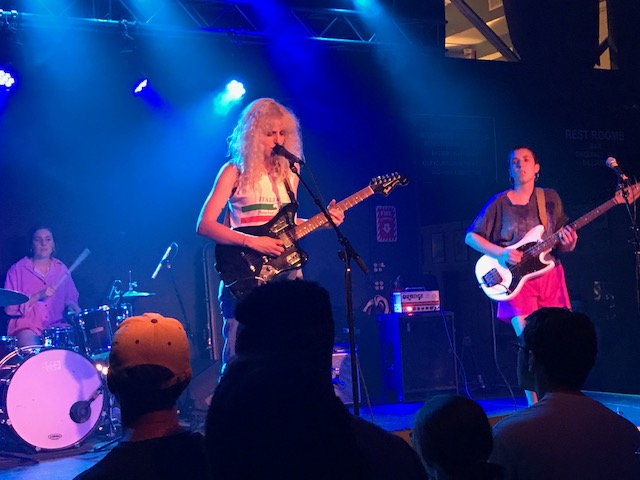All photos are by Molly Dower.
Summer lends itself to a kind of reddened contemplation, body opening and mind-inverting. There’s something about the in-betweens of feeling that get captured in its lethargy, squinting into the sun, and then filing into a dark subterranean venue. We unfortunately arrived too late to catch Lilith, but both Sneaks and Chastity Belt delivered performances that were fit for a dripping summer night.
Sneaks performed songs off of both It’s a Myth and Gymnastics. Delivered over minimalist post punk rhythms, Sneaks’ lyricism compresses challenge, anxiety, and contemplation into spoken word. There’s a laconic, blurry genius to her work and performance. Her lyricism hovers on a knife’s edge, balancing gorgeously claustrophobic description with sharp commentary. She sings “You think you got a lot to say?/No, you think you need a bigger stage/You think I can’t contain my rage” in “Hair Slick Back” and “You’re the opposite of/toddler or infant/you pay in existence/just get a commission” in “Inside Edition.” It’s definitively music to dance to, but it could also be the background score to any number of nervous, involuntary gestures. It lands as perfectly spasmodic and physical.

Chastity Belt mostly performed tracks from their most recent release, I Used to Spend So Much Time Alone, a brilliant, gloves-off reflection on youth and the self. The album presents a mellow vibe, thrumming guitar and easy rhythms, a swirl of indie/shoegaze/post-punk/riotgrrl. If you weren’t paying attention, their performance might seem innocuous–the muted prettiness of a spring walk. The record’s lyrical fixations, however, are anything but sweet. Instead, they’re jaggedly cut musings on the bewildering nature of growing up and looking in the mirror one too many times. The words are especially cutting given than there are no moments of white-hot absolution, primal screams, or last-ditch declarations. True to life, the album’s narrative structure isn’t presented with a concrete beginning, middle and end. Instead, it oscillates between muffled and amplified anxiety, asking litanies of artfully posed questions: Am I okay? Am I really me, and what does that mean anyway?

The album’s tonal lightness contrasts with its viscous brand of lyrical discontent, thick and slow running. The songs evoke the sweaty indecision of twisting around in the sheets, not wanting to get up or lay still. “Complain” and “5 am” fixate on the fog of the unexpressed–the 21st Century ennui of reacting to change with a shrug and a sip of cheap beer, mute in the face of any slight. “Different Now” is an anthem for anyone temporarily blinded by the harsh daylight of young adulthood–manna for acknowledging and combating demons. “Used to Spend” could soundtrack the end credits of a film, conveying some sense of hope and resolution. All were performed with knowing precision and minimal stage banter. The crowd of young Allstonites, clad in overalls, bodysuits, slip dresses, and trucker caps likely had plenty to relate to in the set.
There’s a peculiar warmth in holding a crushed can of PBR, swaying along to lyrics that feel like someone’s worst bedtime thoughts–those that have their genesis in the haziest of strung out nights. It’s an exercise that’s all communality, and all one can ask for from a show, emerging back onto the pavement.


